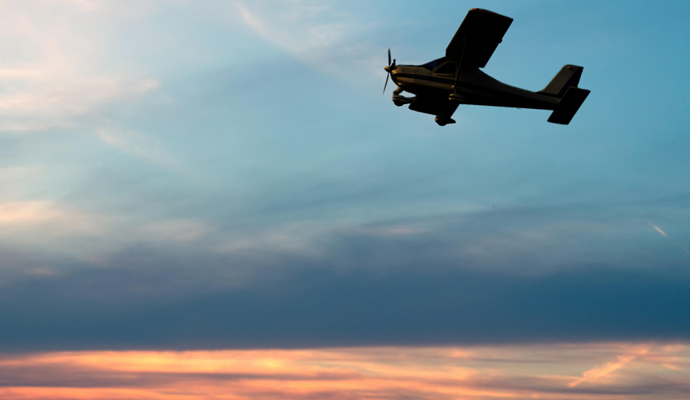Why I Hate Flying, and Other Tales of Management
In an exclusive excerpt from his next book, the eminent strategy guru takes flight against a sea of troubles — and still ends up with a ground delay. Who's to blame? Maybe you.
(originally published by Booz & Company) Welcome aboard, ladies and gentlemen. This is Your Author scribbling: I have some tales for the tormented air traveler. Our Captain has just announced "another little delay." "A little pin in the toe bar is broken in the tug that pushes us back. Maintenance informs me it will be about a three-minute delay," he reassures us. "It's a shear pin. From time to time it breaks." So do our eardrums, My Captain.
Welcome aboard, ladies and gentlemen. This is Your Author scribbling: I have some tales for the tormented air traveler. Our Captain has just announced "another little delay." "A little pin in the toe bar is broken in the tug that pushes us back. Maintenance informs me it will be about a three-minute delay," he reassures us. "It's a shear pin. From time to time it breaks." So do our eardrums, My Captain.
Prior to take on, while you, too, are settling uncomfortably into your seats to laugh about flying, it is my duty to inform you that what I am writing here is about more than flying, and is therefore no laughing matter.
This is an article about management, or at least about the consequences of management. Management is a serious business. I know, because down on the ground I write serious books about management. What you read here is even more serious because it cuts straight through the abstractions into an everyday reality. It shows what my other books merely say: While management may be fine, Management is the problem. For these tales about airlines and airports are not about what they do to us. They are about what we do to each other. I know that everything is a product and everybody is a market. I know that human values must all be reduced to Shareholder Value. But in hospitals? Churches? Gambling casinos? Ping-Pong tournaments? When I discovered that this was happening in the skies, too, so close to the heavens, that was it. I sought my revenge. You are holding it in your hands.
Change Management
Change must always come first, before anything else, preferably instead of everything else. Managing change is important; producing goods and services is incidental.
Airlines are masters at changing cattle into sardines. If you want to fly somewhere, you must begin by being herded — in and out, back and forth, up and down. You stand in line to get a boarding pass to replace the ticket they just sold you. Then you stand in line to show your boarding pass to prove you bought the ticket they just took away from you. After this you stand in line to give back the boarding pass they just gave you. (If you are leaving a European country, they will also ask to see your passport — three times.) This done, you head for the plane, only to stand in line yet again to get to your seat.
Eventually you spot your place in the can. But first you must stand in line one last time while the noodlehead in front of you takes an interminable time to arrange his trunk overhead. Finally your way is clear. All you have to do is arrange your own trunk overhead. It won't take but a minute. But now some other bonehead is glaring at you from behind.
Then you squeeze into your place, legs locked together, knees tucked up, arms clamped tightly by your sides — because this meathead next to you is hogging your armrest. (Isn't it good fences, rather than single armrests, that make for good neighbors?) Never mind. You have found your corner in the can — what the airlines call "Economy Class," or perhaps we should call it Sardine Class.
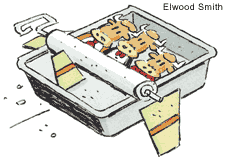 Now it's the plane's turn to stand in line: first to leave the gate, then to take its place among the dozens of other planes waiting to "take off." Finally, as you clasp your cross, star, or economics book to your breast, this winged can races along the ground like some sort of confused bird trying to hurtle itself into the air. Once airborne, you are relieved only by the thought that if it worked for Wilbur and Orville Wright, more or less, it will probably work for you.
Now it's the plane's turn to stand in line: first to leave the gate, then to take its place among the dozens of other planes waiting to "take off." Finally, as you clasp your cross, star, or economics book to your breast, this winged can races along the ground like some sort of confused bird trying to hurtle itself into the air. Once airborne, you are relieved only by the thought that if it worked for Wilbur and Orville Wright, more or less, it will probably work for you.
Training and Development
Training and development is an expensive investment no longer wasted on employees. Because the company is king, the customer must be conditioned to cooperate. McDoughhead's has replaced much of its cleaning staff with customers, who dutifully clear the tables. But for the sheer obedience of their clientele, the airlines are in a class by themselves.
Everything in the plane takes place on cue. As the plane leaves the gate, a flight attendant performs some kind of ritualistic dance on cue, which everyone else ignores on cue. This is accompanied by an announcement in a strange language known only to the airline people: "Welcome-aboard-this-Air-Bla-Bla-flight-from-Budato-Pest-with-stops-in-Puna-and-Perth…." Then the drinks come by on cue, three pieces of ice dropped into each cup on cue, cue, cue. ("Can I have the can?" you ask, on cue.) Later a tray drops before you (on cue) with something they say is food, which you nevertheless eat, on cue.
Soon, on cue, the lights dim, and the entertainment appears, on a little screen on the horizon, yours to enjoy through the head of the basketball player sitting in front of you. The sound is beamed to you more or less on cue through earphones designed especially for the airlines in 1903 by Alexander Graham Bell.
Finally the movie ends. That is the cue for all the aisle people and the acrobats to leap up and line up at the loo. One thing must happen off cue (although just as it's your turn at the loo). If the airplane encounters the slightest breeze, your Captain is obliged to say: "We are passing through a zone of turbulence. Would you kindly return to your seats, fasten your seatbelts, and put your seatbacks to their most uncomfortable position." It is at this point that 375 clicks follow in perfect unison, on cue. You have just experienced "The Airline Salute."
Customer Service
Customer Service is when they smile at you in the front office while trying to figure out how to squeeze more money out of you in the back office.
Ahhh, you say, why put up with all this herding and squeezing? Someone else is probably paying, so why not go Business Class? Be a zillionaire sardine.
But do you really believe a sardine feels better just because it's traveling at several times the price? They may look elegant, all those little fish sitting in their olive oil. But please be assured they're no happier.
In fact, Business Class is a confusing label. Let's call it as it quacks: Pampered Class. The objective is to treat you disgustingly well. This must be to alleviate the airline's guilt. They refer to this as Customer Service. I long for customer service.
 "Excuse me sir, your Alexander Graham Bell earphones." … "Pardon me sir, care for some duty-free, gold-plated gumdrops?" … And now computers have personalized that service with subliminal cue cards submerged electronically into flight attendants' brains. "Excuse me, Mr. Mintzberg, your Château Chirac 1943." … "More Velveeta, Mr. Mintzberg?" … Peace and quiet, Mr. Mintzberg? No, never peace and quiet for Mr. Mintzberg. They are Mistermintzberging me to death. One day I am going to register as Mr. Jackass.
"Excuse me sir, your Alexander Graham Bell earphones." … "Pardon me sir, care for some duty-free, gold-plated gumdrops?" … And now computers have personalized that service with subliminal cue cards submerged electronically into flight attendants' brains. "Excuse me, Mr. Mintzberg, your Château Chirac 1943." … "More Velveeta, Mr. Mintzberg?" … Peace and quiet, Mr. Mintzberg? No, never peace and quiet for Mr. Mintzberg. They are Mistermintzberging me to death. One day I am going to register as Mr. Jackass.
Why don't they just leave me alone? I once asked this profound question of an Air Kanuk flight attendant sitting next to me. "But we are told to do this," she pleaded. "It's called looping." Looping! They have a name for it. I've been looped all these years. Is there no freedom from expression anywhere off this world?
Technique
A technique is something that can be used in place of a brain. Techniques are very popular in management. Here we demonstrate the use of technique in pricing and partnering.
Have you ever noticed that a Pampered Class ticket costs only $1.75 more than one in Sardine Class? Well, OK, I'm really referring to what they call "Full-fare Economy," which should really be called Full-fleece Economy. This is a fare especially for people who have suddenly lost a distant relative. Who else would buy it? If you stay over a Saturday night or fly at 4 a.m. or are chummy with a travel agent — if you do almost anything except claim that your family's pit bull died yesterday — then you get a discount. And I mean a discount! Good thing that poor guy who lost his pit bull is too upset to speak to his neighbors on the flight, because he might discover he paid significantly more than everyone else in the entire row.
Lest you think that I exaggerate, consider recent rates for a round-trip ticket on Uncle Sam Airways between Philadelphia and Frankfurt. They prove beyond any doubt that I am exaggerating far less than the airlines themselves. Pampered Class was $5,574.50; Full-fleece Economy, $3,849. Same plane, same route, same air (but less), although, for the extra money, you do arrive several seconds earlier. In September 2000, the airline offered a sale price of $308 — cheaper by the dozen.
If you have been following the prices lately, you will have noticed something else interesting. Prices are racing down. This is the result of that fierce competition. Every airline does in fact have one dastardly competitor against whom it competes viciously: itself.
This is called yield management. Yield management is another one of those techniques that can be used in place of brains. Think of it as high-tech scalping. Except that the objective is for the airlines to scalp themselves. The purpose is to fill every single seat — at any price. As soon as an empty seat comes up, the hawking begins. No seat must go unfilled. When the airplane finally takes off, 479 seats may well be going at 479 different prices, from $4.79 to $47,900.
Customer Loyalty
You must first know who your customers are — not those who pay, but those who get others to pay. Then you must instill loyalty in these people, which is a tricky business when you have just destroyed your brand with a code-shared flight: Book on you, fly on them.
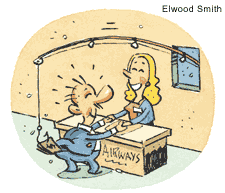 We're not done with pricing yet. Don't forget the points — the "miles." No problem: Airlines never let you forget them. No sooner do you get off one plane than they're looping you with a mail offer to get you on another.
We're not done with pricing yet. Don't forget the points — the "miles." No problem: Airlines never let you forget them. No sooner do you get off one plane than they're looping you with a mail offer to get you on another.
Barbara of Blimey Airways wrote to me recently. "Dear Dr. Mintzberg, We're a bit puzzled. On one hand, we know that you enjoy the comforts and high level of personal service you receive when flying Blimey Airways. On the other hand, we can't figure out why you're not flying Blimey Airways across the Atlantic." Think of it this way, Barbara: I haven't been going to London lately. I refuse to fly to Paris via London just for the sake of your British food.
But I don't think Barbara understood, because she offered me — yes, me — "Double miles on Blimey Airways - across the Atlantic and all over the world!" (Barbara's boldface.) Wowee. "It's almost beyond belief!" the very expensive accompanying card said. Almost.
Maybe Barbara did understand, because when she claimed to "look forward to seeing [me] on board soon," I took the bait. I raced out to get those double miles to London, and then on to Paris, stuck with that British food and no Barbara in sight.
Now, let's take a closer look at points. Whenever anyone tries to bribe you with your own money, watch out. It's a sure sign they're overcharging. If they really want to give you back your money, why wouldn't they simply write you a check?
There must be something else going on here. Today, we call it points. In an earlier incarnation, it was called payola. Back then it was scandal. Payola was the label pegged on those radio disk jockeys who took money from recording companies for playing their songs. Imagine one party taking a reward from a second for spending a third party's money. Like accepting a bottle of whiskey at Christmas time from a supplier. Or a few dollars from a wealthy foreigner to run an election campaign. Unthinkable. So unthinkable that even the tax collectors are afraid to touch this one. Maybe it's because they fly, too.
Personally, I have zillions of points. But I'm not corrupted, because I never get around to using them. I am too busy flying - on other people's money. Not that these free flights are unavailable. They are there for anyone who plans a vacation three years in advance, to Detroit, in December.
Marketing
Marketeers (not marketers), in spite of their subtle modesty, rule the corporations, which means that they rule the world. So pay attention.
Once upon a time, in an airline head office, a finance person bumped into a marketing person at the caviar machine. Such encounters are rare and exceedingly dangerous. After looking around carefully to make sure no one from operations (people who worry about landing gear and the like) was listening, they came up with an idea.
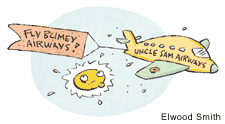 "All those passengers up there. They are all captive, right? All that time and money and no way to use either. We sure can. You remember on television last night they showed these, what do you call them … advertisements. Well, we have television up there too, I seem to recall. And no mute buttons. But we do have 'Seatbelt' signs!!"
"All those passengers up there. They are all captive, right? All that time and money and no way to use either. We sure can. You remember on television last night they showed these, what do you call them … advertisements. Well, we have television up there too, I seem to recall. And no mute buttons. But we do have 'Seatbelt' signs!!"
How about this for an advertisement: "Avarice Airways is delighted to inform you that the Helltown Hotel Chain and Pains Rent-a-Car are our partners in cream on the ground. We know you cannot wait to give them your money. If you do, out of the goodness of our hearts, we shall give you 'Miles'!"
Even if we accept for a moment that these airline people know something about flying, does that make them knowledgeable about sleeping and driving? Not for a moment would I even think that My Airline would act in any interest but my own. Clearly they have negotiated the best possible deals for me. They know just by virtue of me sitting here in Pampered Class that I spend every penny of other people's money with the utmost of care. Still, I have this nagging feeling that I could get a better deal if I asked the floor sweeper.
But I acquiesce. I have been conditioned to consume, programmed to participate. Up here, in the thin air, I can't even tell the difference between the announcements and the advertisements. I am so stupefied by all this yakking and hawking that when I am given a contract consecrating all my sleeping and driving to Helltown and Pains, I sign obediently. But I must admit, it was clever of them to slip it under the immigration card and say, "Sign these, please, Mr. Jackass."
Quality
Quality cannot be measured — that's called quantity, although managements often mix them up. But we know quality when we see it. Except in the rarefied atmosphere of the airplane, where we only know quantity when we see it, let alone eat it.
I am sitting near the back, once again squashed by the window like a sardine, and they bring lunch in cute little boxes. I get a brown one — for carnivores. The guy next to me gets a green one — for vegetarians. He finds vegetarian ham in his sandwich, which looks curiously like my carnivorous ham. So he calls over the flight attendant. "Can't be," she says, "the box is green. It must be vegetarian." He is able to make his point only because, lucky for him, the ham has not yet turned as green as the box.
Now, we don't always get little boxes. On flights of several days, we get little trays. People who have never flown before love those trays. The little cutlery, play knives and forks, and everything tucked into everything else, plus a spot of appetizer and a dab of dessert. Almost like real eating. And in the middle of it all, the pièce de résistance — the main course, all wrapped up. Can't wait to dig under that foil. Do you think the airlines have designated workers to make the food taste bad? (I'm told they're called "Accountants.")
Benchmarking
Benchmarking means comparing your organization to others that are much better than yours so that, at best, you can become second best — alongside everyone else. Becoming good is another matter. Here we ask: Can airports become, if not good, at least almost as good as airlines?
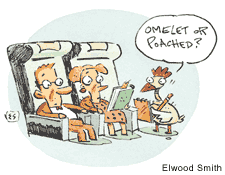 The trouble with flying is we always have to return to airports. Think of how much fun flying would be if we didn't. And, of course, the home of the Global Managers is the international airport. Don't get confused. Transportation is the least of it. The Global Managers meet here, they eat here, and they sleep here. They wait here too, and when they do, above all else, they shop here. (Skiphole Airport, near Amsterdam, has designated the flag as well as the motto for this club. "See. Buy. Fly." their shopping bags scream out in astounding yellow, for people who never made it past "See Jane Run.")
The trouble with flying is we always have to return to airports. Think of how much fun flying would be if we didn't. And, of course, the home of the Global Managers is the international airport. Don't get confused. Transportation is the least of it. The Global Managers meet here, they eat here, and they sleep here. They wait here too, and when they do, above all else, they shop here. (Skiphole Airport, near Amsterdam, has designated the flag as well as the motto for this club. "See. Buy. Fly." their shopping bags scream out in astounding yellow, for people who never made it past "See Jane Run.")
Waiting in airports is when fond memories arise of the family they never see — the little lady, for example, whose skin is longing for the nectars of Provence, her fingers for the minerals of Africa, her lungs for the leaves of Virginia. Lest the minds of these Global Managers wander from the wonders of consumption, the airports considerately provide a few simple reminders — pasted on the carts, printed on the cards, penned into the carpets, plastered on the windows (in Prague, no kidding).
And what bargains! African necklaces for millions. Russian coats for thousands. French perfumes for hundreds. English cigarettes for tens. Canadian toothpicks for ones. Or to pick up a few essentials there's always: groceries (Chernobylois Caviar, Smoked Antarctic Penguin, Beersheba Bacon); clothing (gaiters, gauntlets, galoshes); and discreet personal items (rattlesnake condoms, Château Chirac wines, balsamic vinegar toothpaste).
At this point you must be wondering: If the shopping is so good, the people so friendly, what exactly does Mr. Jackass hate about airports? My answer is simple: Haltrow.
If you want to know what overgrown means, don't waste your time eating genetically modified fruits and vegetables in America. Spend a few hours at Haltrow. What these people call terminals other people call airports. I hear they are introducing scheduled flights between Haltrow's Terminals 3 and 4.
Be careful before you take one, however. Blimey Airways' European flights go out of Terminal 1, its overseas flights out of Terminal 4. Let's say you are going to Amsterdam, Paris even. I'll bet you thought these cities are in Europe. Not according to Haltrow: Their flights go out of Terminal 4. I know the Brits have this thing about Europe, but don't you think this is a bit much? Haltrow has since taken Moscow and Athens out of Europe. Next they'll claim Istanbul is not entirely in Europe.
And if you think Haltrow's terminals are a problem, try parking. Once I got into a bus with a friend to go to her car. That bus made about 15 stops before it finally got to the lot where her car was parked. One of those stops was for another bus — to an "overflow" parking lot. Yet we were lucky. Someone told me recently he missed a flight because every lot was full. He should have parked in Piccadilly Circus and walked.
Structure
Structure means replacing personal human beings with dispensable Human Resources. Treating these Human Resources as categories ensures that they do likewise to those categories called Customers.
So, would you really like to know why I hate flying? You have been patient enough to read this far.
It all came out recently. Over Africa on Air Gaul. Such an innocent question. During breakfast. On top of dinner. "Would you like the omelet or the poached eggs?" the flight attendant asked pleasantly, with just a tiny sparkle in her eyes. She pronounced it clearly, even with those extra words in French. Not "theomeletorthepoachedeggs." Still, it hits me, right then. Everything is so categorical in the sky. Categories for the miles — Diamond, Prestige, Maharaja, etc. And categorical questions at check-in. "Was your bag out of your sight after you packed it?" (Yeah — it was in the back of the car.) Categories for me. Especially me. Like everyone else up here, I'm not a person. I am a category called Passenger. Worse still, Customer.
There is a special word for organizations obsessed with categories. Bureaucracy. Bureaucracy is not about red tape or people who sit on their butts. Bureaucracy is about categories, and airlines are the most categorizing organizations off the face of the earth. Bureaucracies are also about controls. And boy, are airlines and airports about controls — from the highways in to the flying out, the herding, the squeezing, the checking, the selling. Imagine a ticket agent who smiles voluntarily, a pilot who is genuinely interested in not interrupting your peace and quiet, a skyway with paintings by the children of the ground staff.
In my day job, when not flying, I study bureaucracy. There I am supposed to understand — be sympathetic, apologize for them. I used to write things like "The larger the system, the more formalized its behavior" and "The more regulating the technical system, the more formalized the operating work, and the more bureaucratic the structure of the operating core."
That means if we want it big, and calm, we must take it bureaucratic. And if we don't like Sardine Class, and want to go like a dolphin, then maybe we should buy a wetsuit.
So perhaps we shouldn't blame those flying people of the skies. They have to do it all, these Human Resources, flight after flight, day after day, passenger after passenger. It can numb your senses. Maybe we should instead celebrate those human beings of the airplanes and airports who get beyond the categories — and the pretentiousness, plus the Shareholder Values. Like that Blimey flight attendant who turned up on my flight to London and my return flight on the same trip. He was genuinely interested in seeing "Mr. Mintzberg!" whose name he genuinely remembered. (Good thing I didn't register as Mr. Jackass.) He was even genuinely sorry that they were out of the newspaper that they were out of the day before. So here's to you, the human beings of flying who manage to remain human.
More to the point, here's to those who have figured out where managing ends and thinking begins. Formalized behaviors may be great for the maintenance department. But in the sky, we are real people. We live and breathe. Or, at least, we try to.
And this brings us back to that nice flight attendant on Air Gaul, the one with the omelet / or / poached / eggs over Africa. I take the omelet. She smiles: I think she is sincerely interested in my choice. Then she asks clearly if I want coffee or tea — "coffee / or / tea" — and when I reply neither, she understands. "Could I have some orange juice instead?" I ask. She replies I can have orange juice and coffee or tea. Wow! Then I get a brilliant idea. "Could I have two orange juices?" Again, she smiles an honest smile. So do I. I'll bet no one ever took two orange juices in an airplane before. So, here I sit, my omelet / and / veal / sausage framed by a glass of orange juice on each side, feeling ever so individual. Maybe there is hope for flying after all. ![]()
Reprint No. 01114
From the book WHY I HATE FLYING, by Henry Mintzberg.
Copyright © 2001 by Why Henry Hates Flying Publishing Inc.
To be published by TEXERE, LLC. in March 2001
| Authors
Henry Mintzberg, mintzber@management.mcgill.ca Henry Mintzberg is the John Cleghorn Professor of Management Studies at McGill University and a distinguished author of 10 management books. He has contributed to Harvard Business Review, California Management Review, Academy of Management Review, and other major management journals. |


